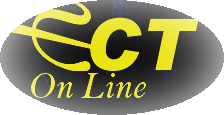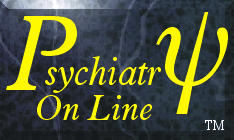Welcome to ECT On-Line
Part of Psychiatry On Line
ECTOL has three broad aims.
The Aims of ECTOL
- Sharing the EVIDENCE
- Structuring TRAINING
- Promoting DEBATE
The internet debate over ECT differs from discussion with patients and indeed with other people who have had direct contact with ECT. I'm not sure why this is - although there is a suggestion that (a bit like when driving a car) people are more likely to express themselves with more extreme language when apparently shielded by the computer screen. Certainly ECT invokes a good deal of emotional response ranging from enthusiastic support to incredulous amazement that the treatment is still legal anywhere.
I am aiming for balance.
ECT as a treatment is evolving, and standardising. Whilst evidence abounds that 'ECT' is effective against depression - a life threatening condition, it is also clear that there are potential side effects that must be considered when a patient agrees to this treatment are not fully determined.
I am approaching this site from the view that ECT does have a place in modern medicine. That makes me biased, but the sociologists put it a better way - my experiences and training, they say, give me 'sensitivities'. Much nicer to be sensitive, then biased isn't it!
I would refer the braver reader to the thoughts of the french social commentator Michel Foucault (1926-1984) (CLICK for Wikipedia entry)who generated the same kind of polarised views as ECT does, but I think helpfully delineated 'The Medical Gaze'. Essentially doctors have a collection of 'sensitivities' that colour their perception of the world. I like M.Foucault's view however particularly because he believed that this is not an inherently bad thing (necessarily)- and that everyone has their own sensitivities (he referred to an internal ATLAS that we all construct of the world) -its just that the medical one exists in part in text books. This approach justifies the increased use of multidisciplinary working within ECT - hence we should be saying that you do not need the opinion of doctors, about ECT, you need the opinion of LOTS of specialisms (and probably several doctors!) in order to gain the most appropriate view for any particular instance where ECT is being considered.
Knowledge is power. That's Foucaulnian too...!!.
The EVIDENCE
Scientists are taught that there are LEVELS of evidence. Taking the lead from the National Institute for Health and Clinical Excellence they talk of levels of evidence. Nicely (no pun intended, but I'll leave it in) listed here:-
Levels of evidence as appears on the Centre for Evidence Based Medicine Website (Oxford UK)
Quite apart from identifying this evidence it is necessary to sort, evaluate and communicate it. medical journals tend to like publishing positive findings and not publishjing negative findings - this publication bias ( positive outcome bias / the file-drawer effect ) is important to consider.
The lowest level of evidence is the 'expert opinion'. However this means there is still no 'evidence' component in the patient's own views! This is clearly wrong and a sign that the scientific world is still some way from joining psychiatry into the community.
In my opionion....ECT, after all, is the specific induction of the brains own treatment mechanism, that of a seizure. Why are all brains capable of doing this? Why has evolution (I'm not a Darwinist unless it suits my argument) given us this? Perhaps the machinery we use to enhance the safety of ECT inadvertently feeds the view that ECT is something that Mary Shelley might have dreamed up on a dark stormy night...(or not- as the story is widely misrepresented following the movie being made 100 years later....check out (if you can spare time for a fascinating diversion) the museum which looks at the science behind the Frankenstein story: The Bakken
A Library and Museum of Electricity in Life).
Nevertheless I do believe ECT should be restricted to (a) those patients that have clearly shown in the past that they benefit, or (b) those patients with severe and treatment resistent (including psychological interventions) mood disorders that are associated with suicidality, non-personality based recklessness, or active self neglect such as refusal to take liquids, or in profound cases, apparent inability to function within the world.
TRAINING
Research is essential. To do research
you need ECT units prepared to do the extra work necessary to turn a clinical service into
a clinical service that encourages patients to assist with expanding our knowledge However before we can research, we must standardise. To standardise we must train our staff. Its less important to train them the right way, then to train them all the SAME way - only then will we be in a position to learn which ways ARE best.
The media confuse ECT with behavioural shock treatment, electrical torture, and often with psychosurgery. It is vital, way before we have OUR arguments with THEM, as impassioned as they are, that WE all be clear exactly what it is WE are talking about.
Debate
Times change. ECT is now acknowledged to
cause memory damage. Not in everyone, but in a signifcant number,. Its now accepted that
autobiographical memory loss (that is the punctate loss of isolated memories, not great
swathes of easily spotted loss) is a feature in a third or possibly many more patients after ECT. Partly it has taken pressue groups for patients to drive this into the awareness of the scientists.
When a patient consents to ECT they NEED TO KNOW this. It does not necesarily
follow that proof of memory change makes ECT bad, or untenable. Oncologists treat cancer by
poisoning thier patients - you have to study the potential costs and the potential gains- and the balance between the two will be uniquely applicable to one person. Anyone that says "all treatments are good (or bad)" is missing a point"
Reasoned debate may not be evidence- but it is the starting seed for ideas that can then be examined using techniques that the scientific world will pay attention to.
Two New Discussion Groups
Debate is good, and so I hope that the introduction of TWO new email lists - both of which will be rigorously pruned for on-topic and spam free content should provide a forum for everyone with an interest in ECT and for ECT professionals specifically who wish to refine their views and perhaps work on reseaching the assumptions that continue to be made about ECT.

Click to join ECTonlineList a general discussion list for everyone

Click to join ECTdiscussion







